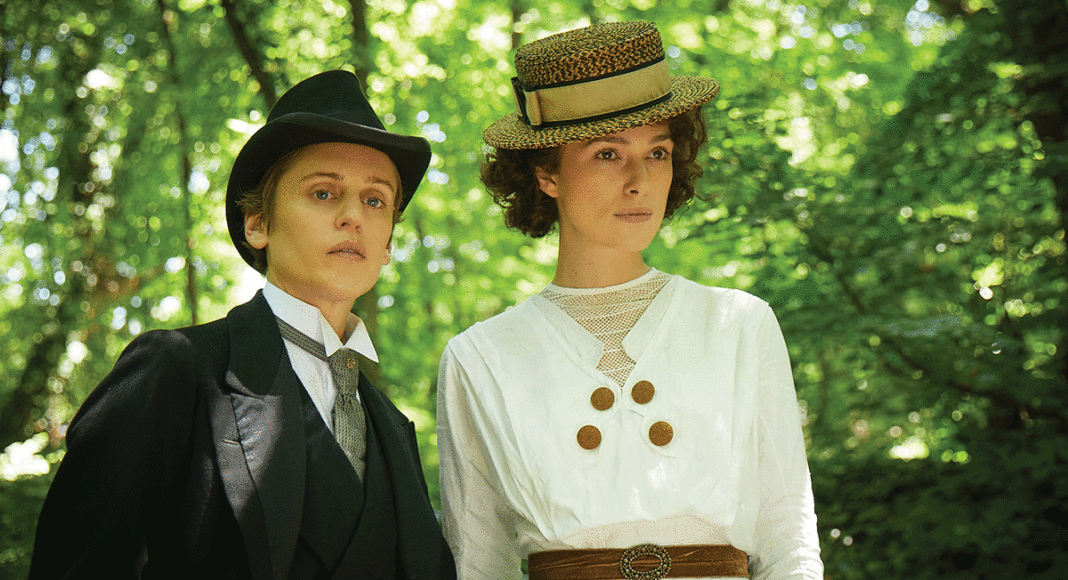Even for an era of such artistic and cultural ferment as the turn of the last century, famed French author Colette led an extraordinary life.
She was a country girl dominated by her sophisticated husband who became the toast of Paris for her wildly successful, trendsetting novels. She was also a music hall performer who scandalized the public, a lover of men and women, a cross-dresser, and an accidental advocate for equality who had to fight for the right to publish her work under her own name.
If her life was the stuff of melodrama, it was always tempered by her wit and wry self-knowledge in her books, reviews and voluminous letters to friends and family. In his biographical feature, Colette, filmmaker Wash Westmoreland sticks to her early years in Paris, during the metamorphosis by which she would eventually turn herself into the celebrated author. As portrayed by Keira Knightley, this Colette is all good-humored innocence and coltish bravado. The film ends just as she’s about to launch herself back into the world on her own terms, so we never get a sense of the wry wisdom of the author’s maturity, but Knightley is appealing as an awakening personality in the making.
Co-written by Westmoreland (Still Alice), with Richard Glatzer and Rebecca Lenkiewicz, the movie begins in 1892, at a remote house in the French countryside of Saint-Sauveur. Nineteen-year-old Sidonie-Gabrielle Colette (Knightley), her beloved mother Sido (Fiona Shaw), and her father are entertaining Willy (Dominic West), a renowned magazine writer and critic from Paris, whose father knew Colette’s father in the military.
A year later, Willy and Colette are married and living in Paris. There she discovers that “Willy” is a cottage industry; he employs other writers to crank out the work that appears in the press under his name. And while Willy always has money to spend on salons, gambling and mistresses (“That’s what men do!” he splutters, when the outraged Colette catches him in the act), their finances always seem precarious.
To stave off creditors, her husband decides “Willy” should write a novel, and assigns the task to Colette, who is already writing all his personal correspondence. She balks at first, but when he physically locks her in her study to work, she starts writing about her own schooldays. The book, Claudine at School, is an immediate bestseller. Together with its three sequels, it influences a generation of young women, who copy Claudine’s clothes and hair, bathe with “Claudine” soap, and nibble “Claudine” chocolates. But the books all come out under the name of “Willy,” who refuses to compromise his “brand” by allowing Colette to take credit for her own work.
Bolstered by new confidence over her books’ success, however, Colette begins to experiment in other aspects of her life. She joins a cabaret act with mime George Wague (Dickie Beau), begins an affair with transplanted American socialite Georgie Raoul-Duval (Eleanor Tomlinson, familiar as Demelza on TV’s Poldark) and forms a deep bond with an audacious French aristocrat, Missy (Denise Gough), who dresses as a man and responds to the pronoun “he.”
Willy’s attempts to insert himself into these adventures (starting his own affair with Georgie; turning Colette’s stage debut into an ill-fated PR stunt) are presented here as ways of trying to keep his wife on a short leash. But considering the power he wielded over her due to his own celebrity, and the fact that he controlled the rights to the Claudine books, it’s satisfying to watch Colette evolve out of his shadow toward a new life built around her own talent.
No feature-length movie could do more than scratch the surface of the real-life Colette’s long, rich and productive life (she died in 1954 at age 81), or include her expansive circle of friends, artists, writers, mentors and devotees. But the movie looks beautiful (largely shot in old-world Budapest), and Knightly captures enough of Colette’s spirit of adventure to encourage viewers to explore the rest of her story.
COLETTE
*** (out of four)
With Keira Knightley, Dominic West, Denise Gough and Fiona Shaw. Written by Wash Westmoreland, Richard Glatzer, and Rebecca Lenkiewicz. Directed by Wash Westmoreland. A Bleecker Street release. Rated R. 112 minutes.














